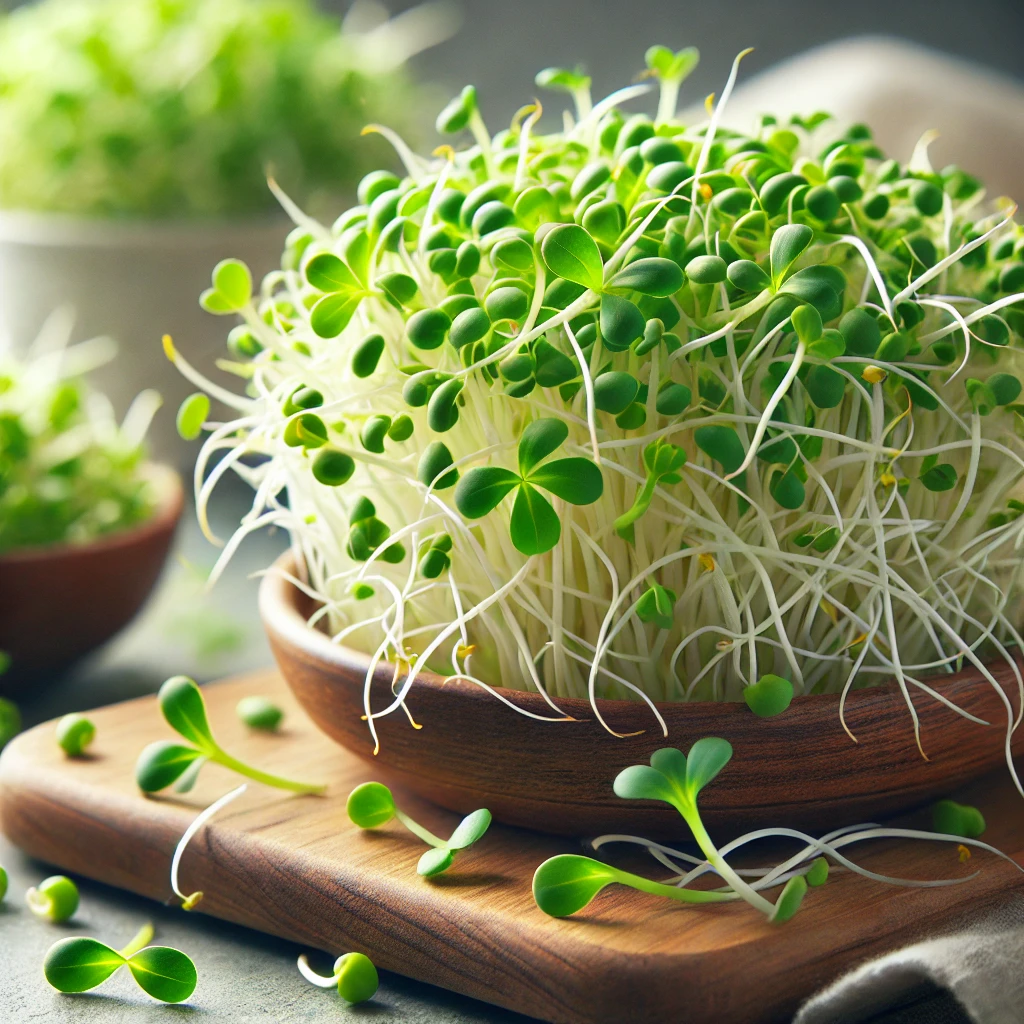The Benefits of Alfalfa Sprouts

Alfalfa sprouts are young shoots of the alfalfa plant (Medicago sativa), a legume known for its nutrient density and health benefits. These tiny sprouts are low in calories but rich in essential vitamins, minerals, and plant compounds that promote overall health.
Alfalfa sprouts are packed with nutrients and offer several health benefits, including:
- Rich in Nutrients – They are a great source of vitamins A, C, K, and several B vitamins, along with essential minerals like calcium, magnesium, and iron.
- High in Antioxidants – Alfalfa sprouts contain powerful antioxidants that help fight free radicals, reducing oxidative stress and inflammation.
- Supports Digestion – They are high in fiber and contain enzymes that can aid in digestion and gut health.
- May Help Lower Cholesterol – Studies suggest that compounds in alfalfa, such as saponins, can help reduce LDL (bad) cholesterol levels.
- Regulates Blood Sugar – Some research indicates that alfalfa sprouts may help regulate blood sugar levels, making them beneficial for people managing diabetes.
- Supports Bone Health – The vitamin K and calcium content in alfalfa sprouts contribute to strong bones and may help prevent osteoporosis.
- Boosts Immune System – Their high vitamin C content supports immune function and helps fight infections.
- Aids in Detoxification – Alfalfa sprouts have diuretic properties that help flush out toxins and support kidney health.
- Alfalfa sprouts are young shoots of the alfalfa plant (Medicago sativa), a legume known for its nutrient density and health benefits. These tiny sprouts are low in calories but rich in essential vitamins, minerals, and plant compounds that promote overall health.

10. Heart Health:
Alfalfa sprouts may help lower blood pressure and cholesterol due to their high levels of potassium and saponins, which are plant compounds that help reduce LDL (bad) cholesterol and increase HDL (good) cholesterol.11. Hormonal Balance:
Alfalfa contains phytoestrogens, plant-based compounds that mimic estrogen in the body. This makes them potentially beneficial for women experiencing menopausal symptoms or those looking to support hormonal balance.12.Weight Management:
With their high fiber and water content, alfalfa sprouts help promote satiety, reducing cravings and supporting weight loss. They’re also very low in calories, making them a great addition to healthy meals.13. Anti-Inflammatory & Detoxifying Properties:
Alfalfa sprouts contain chlorophyll, which has been linked to detoxification benefits, helping to cleanse the liver and blood. Their antioxidant content also helps reduce inflammation, which can lower the risk of chronic diseases.14. Blood Sugar Control:
Some studies suggest that alfalfa sprouts may improve insulin sensitivity and help regulate blood sugar levels, making them a good choice for people managing diabetes or prediabetes.How to Eat Alfalfa Sprouts
- Add them to salads, sandwiches, wraps, or grain bowls
- Use them as a garnish for soups and stir-fries
- Blend them into smoothies or green juices
- Toss them into an omelet or scrambled eggs
Because sprouts can sometimes carry bacteria like E. coli or Salmonella, it’s important to buy them fresh, store them properly in the fridge, and rinse them thoroughly before eating. Some people prefer lightly steaming them to reduce the risk of contamination.





